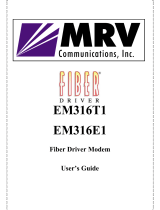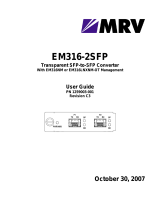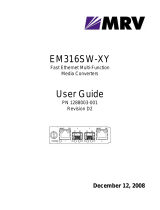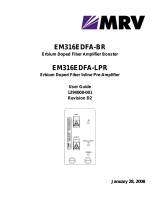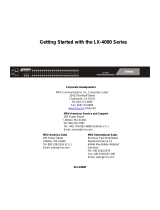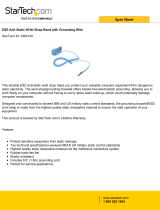Page is loading ...

EM316E3
EM316E3SF
E3 Fiber Modem
Fiber Driver Module
User’s Guide

Fiber Driver
EM316E3 & EM316E3SF
P/N: 1226006-001, REV_L PAGE 2
Registration Card
Your name: Mr./Ms___________________________________________
Organization: ________________________Dept. __________________
Your title at organization:______________________________________
Telephone: ___________________________ Fax:__________________
Organization's full address:____________________________________
__________________________________________________________
Country:___________________________________________________
Date of purchase (Month/Day/Year):_____________________________
Serial number:
Product was purchased from:
Reseller's name:____________________________________________
Telephone:___ __________________ Fax:_______________________
Reseller's
full address___________________________________________________
___________________________________________________
Answers to the following questions help us to support your product:
1. Where and how will the product primarily be used?
Home Office Travel Company Business Home Business Personal Use
2. How many employees work at installation site?
1 employee 2-9 10-49 50-99 100-499 500-999 1000+
3. What network medium/media does your organization use ?
Fiber-optics Thick coax Ethernet Thin coax Ethernet
10BASE-T UTP/STP 100BASE-TX 100BASE-T4 100VGAnyLAN
Others_________________
4. What category best describes your company?
Aerospace Engineering Education Finance Hospital
Legal Insurance/Real Estate Manufacturing
Retail/Chain store/Wholesale Government
Transportation/Utilities/Communication VAR System house/company
Other________________________________
5. Would you recommend your Fiber Driver product to a friend?
Yes No Don't know yet

Fiber Driver
EM316E3 & EM316E3SF
P/N: 1226006-001, REV_L PAGE 3
EM316E3
EM316E3SF
E3 Fiber Modem
Fiber Driver Module
User’s Guide

Fiber Driver
EM316E3 & EM316E3SF
P/N: 1226006-001, REV_L PAGE 4
TABLE OF CONTENTS
1 INTRODUCTION
2 HARDWARE INSTALLATION
3 TROUBLESHOOTING
4 TECHNICAL SPECIFICATIONS
5 CONTACT INFORMATION
6 GLOSSARY
7 ORDERING INFORMATION

Fiber Driver
EM316E3 & EM316E3SF
P/N: 1226006-001, REV_L PAGE 5
1 INTRODUCTION
About this Manual
Before unpacking please refer to section 2 (Hardware Installation)
This manual is a guide to the installation and operation of the EM316E3 Fiber modem.
Product description describes the product, its functions, features, protocol supported,
minimum requirements, and typical applications.
Customer support provides information on return policy and customer support
information.
Glossary provides definition to terms used in this manual.
Product Description
The EM316E3 modules of the Fiber Driver Family are Fiber Modems designed to
convert a E3 interface into high-speed fiber optic interface, thus enabling the extension of
the E3 maximum spanning distance up to fiber optic distance limit. These units convert
the electrical signals from a coax cable to optical signals and transmit them over distances
of up to 7km on multimode fiber, or distances of up to 100km on singlemode fiber. The
EM316E3 supports ITU-T G.703, ITU-T G.823, and HDB3 line codes.
The EM316E3SF Fiber Driver's single fiber modules use unique technology that provides
the ability to combine TX and RX signals onto a single fiber strand. This effectively
doubles the available fiber in a network and eliminates the need for additional fiber
connections. An identical EM316E3SF unit is required on the other end, using either
standard APC (Angled PC) patch cords finish or a 3M VAR APC finish. The standard
APC finish provides a <60dB back reflection, whereas the 3M VAR exceeds –70dB.
Both APC finishes are polished to an 8
o
angle and minimize back reflection by forcing
the reflected rays into the cladding.
The Fiber Driver family provides conversion solutions with greater distances and better
manageability than any other products on the market. Multimode to Single Mode fiber
conversion modules offers link distances from 0 km to 100 km.

Fiber Driver
EM316E3 & EM316E3SF
P/N: 1226006-001, REV_L PAGE 6
Features
• E3 conversion between coax media and fiber media
• Supports ITU-T G.703, ITU-T G.823, and HDB3 standards
• Supports Local, Remote and Line Loop back Test
• Up to 100km Transmission on Single Mode or 7km on Multimode Fiber
• Modules can be Inserted / Removed without powering off the chassis
• Extensive Network Management Support when used with EM316NM
*For dB budget see: ftp://ftp.fiberdriver.com/pub/doc/spec/fiberdriver
Requirements for Managed Module
EM316NM Management Firmware version 4.0 or later
For firmware released version go to:
ftp://ftp.fiberdriver.com/pub/software/em316nm
For firmware beta version go to:
ftp://ftp.fiberdriver.com/pub/software/beta/em316nm
MegaVision Network Management version 1.20 or later
Connectivity
Connectors Used
Coax: 75 Ω BNC (2 connectors: 1 for TX, 1 for RX)
Fiber: SC, or SC-APC (for single fiber)
Cable Requirement
Coax: RG58/U (Max Length=900 feet)
Fiber: SC-SC fiber cable, or SC-APC fiber cable (for single fiber)
Port Description
Port# Port Description
Port 1 E3 Coax, Conforms to ITU-T G.703, ITU-T G.823, and HDB3 standards
Port 2 E3 Fiber, Multi-Mode: 1310nm, 0-2km
Multi-Mode: 1310nm, 2-7km
Single Mode: 1310nm, 0-25km
Single Mode: 1310nm, 25-50km
Single Mode: 1550nm, 50-100km

Fiber Driver
EM316E3 & EM316E3SF
P/N: 1226006-001, REV_L PAGE 7
Display Information (LED Definition)
• PWR: illuminates when unit is powered (green color)
• LPBK: illuminates (yellow color) when local loop back on both interfaces is enabled,
OFF (no light or green color) when in normal mode
• C: illuminates when E3 (coax) interface detected a signal above threshold level
• SD: illuminates when Fiber Optic interface detected a signal above threshold
level
• PLL: illuminates when phase lock loop (PLL) detected enough transition for
locking; (ACT was changed to PLL on the Panel)
• STBY: illuminates (yellow color) when Fiber Optic link is transmitting an idle signal
because E3 (coax) signal is absent, OFF (no light) when in normal mode
Typical Applications
EM316E3 (E3 Coax To E3 Fiber Multimode or Singlemode)
Coax
Coax
Fiber O
p
tic
DTE
DTE

Fiber Driver
EM316E3 & EM316E3SF
P/N: 1226006-001, REV_L PAGE 8
Configuration
Jumper Settings: (Factory Default)
CONFIGURING THE SWITCH (S1)
SWITCH SETTINGS RESULTS
*ON Force switches selections (loop back) regardless of NMS command
MAN/NMS
OFF Default setting comes from switches after power up, but maybe change by NMS
commands
SEC/PRI ON/OFF
Not used in this application. Reserved for the dual-redundant card.
Setting is irrelevant to the card
ON Loop back mode enabled
LPBK/NORMA
L
OFF Normal mode enabled
*ON Cable length is longer than 250 feet
LONG/SHORT
OFF Cable length is shorter than 250 feet
SW5 ON/OFF Setting is irrelevant to this card at this time
Note: LONG/SHORT settings shown above are the recommended setup, but can be change
to other polarity if better results/performance can be achieved.
Default Setup: MAN/NMS, LONG/SHORT: ON. All other switches: OFF
IMPORTANT NOTICE
The jumper settings shown above should be use only on expansion modules that has
printed circuit board assembly (PCBA) number: 1226062-007 or later. This number can
be found on a white bar coded label located at the bottom side of the expansion module.
ON
ON OFF
5
4
3
2
54321
S1
5 FORCE / AUTO
4 LONG/SHORT CX
3 LPBK/NORMAL
2 SEC/PRI
1 MAN/NMS
1

Fiber Driver
EM316E3 & EM316E3SF
P/N: 1226006-001, REV_L PAGE 9
Theory of Operation
Block diagram of the Modem/Converter is shown below (fig. 1)
Fig. 1 Block Diagram of EM316DS3
E3 Line Receiver to fiber optic Transmitter:
The receiver Line Interface Unit (LIU) receives the E3 signal and performs clock recovery and
data detection. The data goes through B3ZS Decoding Block to extract NRZ data. It then goes to
an encoding block and is ready to be transmitted by the Fiber Optic Transmitter Interface.
Fiber optic Receiver to E3 Transmitter:
The fiber optic Receiver Interface directs the received signal to a decoder in order to extract the
NRZ data. The NRZ data is going through B3ZS encoder and then to the E3 Transmitter.
Loop Back:
This feature isolates the optic side from the E3 side, and enables each side to loop back on its own
media line as shown below:
Switch LPBK/NORM is set to ON
When switch LPBK/NORMAL is turned ON, the card is configured as follows:
Optic input to the receiver is looped back into optic transmitter, thus enabling remote site to
perform loop back on fiber optics. Note that this loop back includes the encoder and decoder
blocks of the fiber optic. E3 receiver input is looped back into E3 transmitter, thus enabling full
loop back on E3 line side. The route of the loop back includes the logic of decoder and encoder
blocks of the E3.
Loopback
On E3
side
Loopback
On Fiber side
Fig. 2
Coax to
near DTE
Fiber to far
EM316E3
E3
R
ece
i
ver
B3ZS
D
ecoder
Encoder
FI
Tran
s
mitt
er
E3
Tran
s
mitt
er
B3ZS
En
coder
Decoder FI Receiver
Fig. 1

Fiber Driver
EM316E3 & EM316E3SF
P/N: 1226006-001, REV_L PAGE 10
Switch LPBK/NORM is set to OFF
Switch LPBK/NORM is set to OFF
Loop Back Control: By NMS command or manually by a switch
Loop back can be forced regardless of management by turning switch 1 MAN/NMS to ON and
switch 3 NORM/LPBK to ON.
NOTE: It is also possible to configure an external loop, either on E3 side or the fiber side, the
switch LPBK/NORMAL should remain in NORM position since the card is in its Normal mode.
For external Fiber optic loop back, connect a fiber between RX SC connector and TX SC
connector see (fig 3a). For external E3 loop back connect a coax cable between RX BNC
connector to TX BNC connector (fig 3b)
Loop back on
Fiber side
E3 side
Coax to near DTE
Fiber side
To far EM316E3
Loop back on
E3 side
Fig. 3a: External loop back on fiber optic
Fig. 3b: External loop back on fiber optic

Fiber Driver
EM316E3 & EM316E3SF
P/N: 1226006-001, REV_L PAGE 11
2 HARDWARE INSTALLATION
PREPARATION
STEP 1 Follow all Safety Regulations
1 Eliminate static electricity in the workplace by grounding operators, equipment, and devices
(components and computer boards). Grounding prevents static charge buildup and
electrostatic potential differences. Transporting products in special electrostatic shielding
packages avert electrical field damage.
2 An effective workplace should be outfitted with the following items:
a) ESD protective clothing/smocks: Street clothing must not come in contact with
components or computer boards since the various materials in clothing can
generate high static charges. ESD protective smocks, manufactured with
conductive fibers, are recommended.
b) Electrostatic shielding containers or totes: These containers (bags, boxes, etc.)
are made of specially formulated materials, which protect sensitive devices
during transport and storage.
c) Antistatic or dissipative carriers: These provide ESD protection during
component movement in the manufacturing process. It must be noted that
antistatic materials alone will not provide complete protection. They must be
used in conjunction with other methods such as totes or electrostatic shielding
bags.
d) Dissipative tablemat: The mat should provide a controlled discharge of static
voltages and must be grounded. The surface resistance is designed such that
sliding a computer board or component across its surface will not generate
more than 100 V.
e) Personal grounding: A wrist strap or ESD cuff is kept in constant contact with
bare skin and has a cable for attaching it to the ESD ground. The purpose of the
wrist strap is to drain off the operator’s static charge. The wrist strap cord has a
current-limiting resistor for personnel safety. Wrist straps must be tested
frequently to ensure that they are undamaged and operating correctly. When a
wrist strap is impractical, special heel straps or shoes can be used. These items
are effective only when used in conjunction with a dissipative floor.

Fiber Driver
EM316E3 & EM316E3SF
P/N: 1226006-001, REV_L PAGE 12
f) ESD protective floor or mat: The mat must be grounded through a current-
limiting resistor. The floor or mat dissipates the static charge of personnel
approaching the workbench. Special conductive tile or floor treatment can be
used when mats are not practical or cause a safety hazard. Chairs should be
conductive or grounded with a drag chain to the flooring.
STEP 2 Determine the best location for the chassis.
Affix the chassis to a 19” or 23” rack using the enclosed rack mount ears, or place the unit on
a secure, flat surface. Ensure that the unit is within reach of the necessary connections (i.e.
power outlet, Ethernet connections, and, if the chassis will be monitored via serial port, and
either a PC, UNIX workstation, or modem).
STEP 3 Make sure there is enough space to pull and connect both the
electrical and optical cables without stressing them beyond the
manufacturer’s limitation (bend radius minimum).
STEP 4 Plug in the chassis
Connect the power cord (s) to the chassis and an outlet. Turn the power switch (es) to ON
position. The wide-ranging power supply adjusts to any outlet.
STEP 5 Unpacking the unit
Verify that no visible damage has been caused to the outer box. Remove all material from the
packing box and confirm receipt of the following:
Fiber Driver module unit
User’s manual (this manual in printed format or on a CD)
In the unlikely event that anything is missing, contact your authorized dealer or
representative. If it becomes necessary to return the unit, repackage the unit in its original
box.

Fiber Driver
EM316E3 & EM316E3SF
P/N: 1226006-001, REV_L PAGE 13
UNIT INSTALLATION
STEP 1 Remove required amount of blank panels from the NC316BU-xx.
NOTE: Per FCC regulations, either a panel or a module should always cover chassis slots.
FIGURE 1.1 Take out the required amount of blank panels.
STEP 2 Align the edges of the EM316 module to the rail inside the chassis,
see pictures below.
FIGURE 1.2 Align the edges of the EM316 to the rail inside the chassis and then insert the unit.

Fiber Driver
EM316E3 & EM316E3SF
P/N: 1226006-001, REV_L PAGE 14
STEP 3 Insert the module into the NC316BU-xx unit
NOTE: To avoid damaging any components on the module, handle it by the edges, using
your thumb to push it securely inside the chassis. Do not use excessive force, but
make sure the module is fully inserted in the chassis. When the module is
correctly inserted, the PWR LED should illuminate.
STEP 4 Secure the module to the unit, using the screws on the front panel.
FIGURE 1.3 When the module is correctly inserted, the PWR LED should illuminate.
WARNING! Fiber optic equipment can emit laser or infrared light that
might injure your eyes. Never look into an optical fiber or connector port.
Always assume that fiber optic cables are connected to a light source.

Fiber Driver
EM316E3 & EM316E3SF
P/N: 1226006-001, REV_L PAGE 15
3 TROUBLESHOOTING
The Fiber Driver series are highly reliable units. If there are any operating
problems, the fault probably lies in some other aspect of the configuration.
However, if after following the troubleshooting steps below (in order), you
find that the unit is still not functioning correctly, please contact your local
representative.
Review all link LEDs to ensure that those ports you believe should be
functioning are properly attached to a cable.
Verify the correct fiber optic cables are being used, i.e. multi-mode or single
mode.
Review all link LEDs to ensure that those ports you believe should be
functioning are properly configured.
If the suspect ports are not configured properly, re-configure the port
through SNMP management or the Administrative Interface.
Ensure that the equipment attached to this module is configured properly.
Verify that the output power of the fiber optic port(s) is within
manufacturer’s specification for output power, for more information please
see the link below:
ftp://ftp.fiberdriver.com/pub/doc/spec/fiberdriver
Verify that the dB loss of the Fiber cable you are connecting to is within the
dB budget for this module, for more information please see the link below:
ftp://ftp.fiberdriver.com/pub/doc/spec/fiberdriver

Fiber Driver
EM316E3 & EM316E3SF
P/N: 1226006-001, REV_L PAGE 16
4 TECHNICAL SPECIFICATIONS
Electrical
5VDC @ 2 Amps Max
Hot Swappable
Operating Temperature Range
0°C - +50 °C (32°F – 122°F)
Storage temp
-10°C - +60°C (14°F – 140°F)
Relative Humidity
85% maximum non-condensing
Emissions Compliance
FCC Part 15, Subpart B, 1999 Class A
CE Mark
EN 50081-1: 1992
EN 50082-1: 1997
EN 55024: 1998
EN 55022: 1998
AS/NZS 3548: 1995
Physical Dimensions
1” high x 3” wide x 7” deep (2.54cm x 7.62cm x 12.78cm)
Weight
9.6 oz (0.36 kg)
Color
Black

Fiber Driver
EM316E3 & EM316E3SF
P/N: 1226006-001, REV_L PAGE 17
5 CUSTOMER SUPPORT
Contact Information
If you have any questions, please do not hesitate to contact us at:
Americas Support
MRV (East Coast USA)
295 Foster Street
Littleton, MA 01460-2016
Tech Support: (800) 338-5316
Tech Support: (978) 952-4700
E-mail: [email protected]
Fax: (978) 952-4880
URL: http://www.fiberdriver.com
MRV (West Coast USA)
20415 Nordhoff St.
Chatsworth, CA 91311
Tel. (800) 338-5316
Tel. (818) 773-0900
International Support
MRV International
Business Park Moerfelden
Waldeckerstrasse 13
64546 Moerfelden – Walldorf
Germany
Tel. (49) 6105/2070
Fax (49) 6105/207-100
Manual Information
The most recent version of this manual may be found on our ftp site:
ftp://ftp.fiberdriver.com/pub/doc/manuals/

Fiber Driver
EM316E3 & EM316E3SF
P/N: 1226006-001, REV_L PAGE 18
5 GLOSSARY
Complete definition of networking terms (jargon) used in this manual, may
be found on our ftp site:
ftp://ftp.fiberdriver.com/pub/doc/Glossary.pdf
6 ORDERING INFORMATION
Please visit us at http://www.fiberdriver.com for the latest updates on our products.
Fiber Driver Division of MRV
Chatsworth, CA 91311
Phone: (818) 772-6235 or (800) 966-4444
Fax: (818) 772-0576
Fiber Driver Inquiries: [email protected]
Marketing: [email protected]
Repair Services: [email protected]
*Note: For dB budget see: ftp://ftp.fiberdriver.com/pub/doc/spec/fiberdriver

Fiber Driver
EM316E3 & EM316E3SF
P/N: 1226006-001, REV_L PAGE 19
Place
Stamp
Here
------------------------------------------------
------------------------------------------------
------------------------------------------------
8928 Fullbright Avenue
Chatsworth, California 91311
U.S.A.
/
